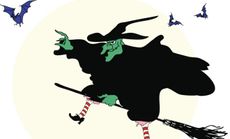
Arika Okrent
Arika Okrent is editor-at-large at TheWeek.com and a frequent contributor to Mental Floss. She is the author of In the Land of Invented Languages, a history of the attempt to build a better language. She holds a doctorate in linguistics and a first-level certification in Klingon. Follow her on Twitter.
Latest articles by Arika Okrent
-

Explained: English's 3 different prefixes for 'half'
feature Semi, hemi, demi
By Arika Okrent Last updated
feature -

5 pairs of countries that Americans confuse
feature Newsflash: The Czech Republic is not the same as the Russia region of Chechnya
By Arika Okrent Last updated
feature -

4 changes to English so subtle we hardly notice they're happening
feature Among them: The rise of the "get-passive"
By Arika Okrent Last updated
feature -

How the U.S. made war with the language of peace
feature Poor, poor Esperanto
By Arika Okrent Last updated
feature -

14 Swedish words that conflict with the Ikea products they name
feature Some of these make absolutely no sense
By Arika Okrent Last updated
feature -

How many words do Eskimos really have for snow?
feature Depending on whom you ask, anywhere from 2 to 99
By Arika Okrent Last updated
feature -

10 words with difficult-to-remember meanings
feature It's okay. We're confused, too.
By Arika Okrent Last updated
feature -

Rules shmules: 5 phonetic pitfalls of shm- reduplication
feature With shm- you can be simultaneously grumpy and cute. But it's not always easy to figure out where to put the shm-
By Arika Okrent Last updated
feature -

9 extremely pretentious Latin and Greek plurals
feature What do you do when you're talking about more than one octopus?
By Arika Okrent Last updated
feature -

3 awesome translations from this sign language rap battle on Jimmy Kimmel Live
feature Attitude is universal
By Arika Okrent Last updated
feature -

Watch the Surf Punks explain the latest slang in this 1980s news report
feature Radical, dude
By Arika Okrent Last updated
feature -

15 less-than-inspirational quotes from a book of moral advice
feature Reaching for the stars probably isn't the most practical advice after all...
By Arika Okrent Last updated
feature -

11 tragic emotions and how to properly act them out on stage (according to an 1889 guide)
feature "Silent sorrow" could be your ticket to stardom
By Arika Okrent Last updated
feature -

7 geeky-cool translations of Hamlet
feature Hamlet has been translated into hundreds of languages. But normal human languages can be so boring...
By Arika Okrent Last updated
feature -

Don't Ask, Don't Tell: The end of a policy, the beginning of an idiom
feature It's been two years since the repeal of the policy, but the phrase seems here to stay
By Arika Okrent Last updated
feature -

Should U.K. schools shame students who use regional slang?
The Explainer One campus in Northeast England wants to zap phrases like "gizit ere" and "he was sat there"
By Arika Okrent Last updated
The Explainer -

Tips for keeping your tenement tidy (in 1911)
feature The Martha Stewart of early 20th century tenement living has some advice for young ladies
By Arika Okrent Last updated
feature -

The strange evolution of 'because'
feature Because reasons
By Arika Okrent Last updated
feature -

4 good reasons why people say 'I could care less'
feature No, you couldn't
By Arika Okrent Last updated
feature -

Why does Q almost always go with a U?
feature Good question
By Arika Okrent Last updated
feature -

How many spaces should there be at the end of a sentence?
feature Grammar nerds, sharpen your swords!
By Arika Okrent Last updated
feature -

The first words of 11 famous people
feature You'll never guess whose first words were "Don't do that"
By Arika Okrent Last updated
feature -

The world's greatest alphabet
feature Happy belated Hangul Day!
By Arika Okrent Last updated
feature -

5 baffling foreign-language versions of the Fresh Prince of Bel-Air theme song
feature "Here is my kingdom, here is where I strive. Here I will reign as Prince of Bel-Air."
By Arika Okrent Last updated
feature
